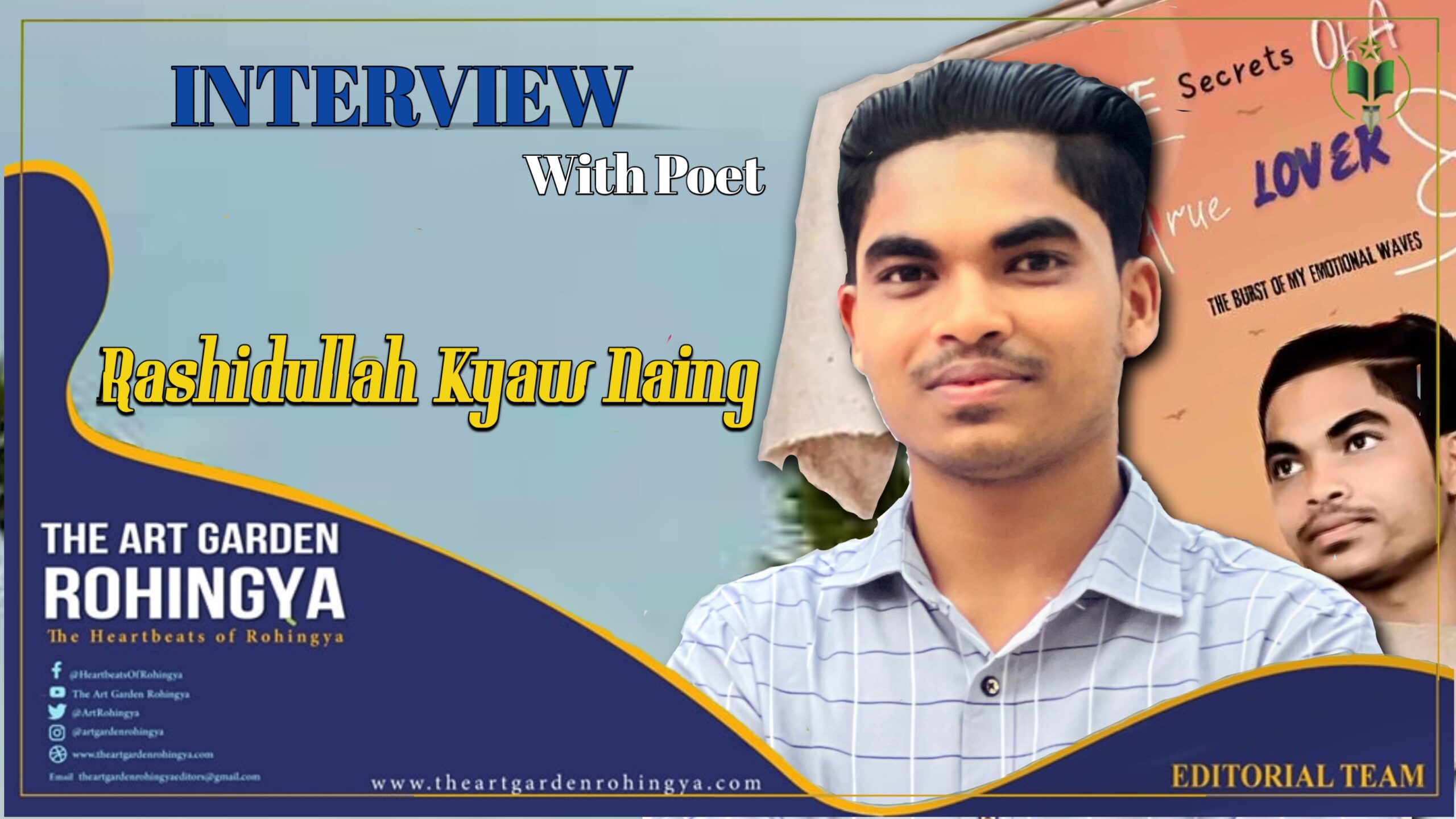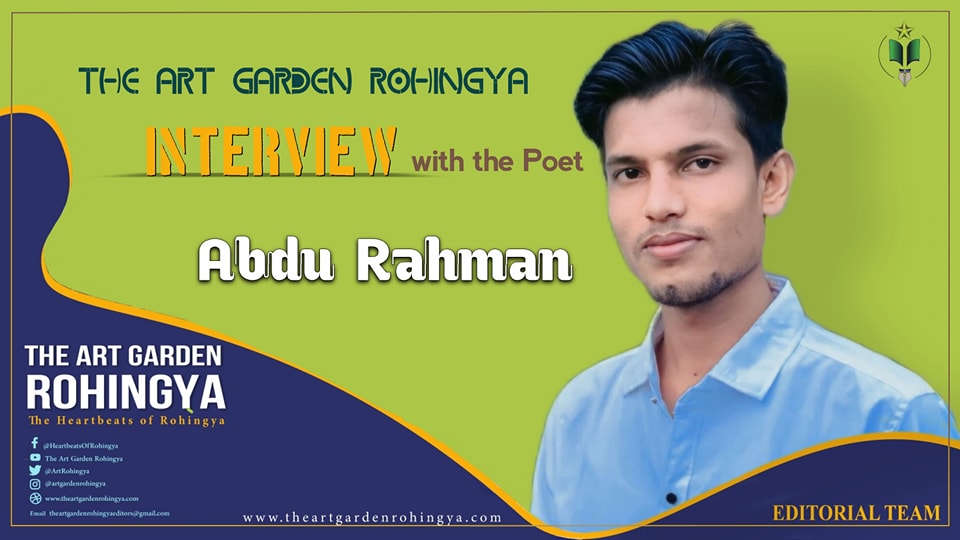The Art Garden Rohingya Interview
With the poet Pacifist Farooq
June 30 , 2022.
The Art Garden Rohingya is the first Rohingya community poetry and art platform. We publish poetry and other forms of artworks in print, online website and social media and hence, encouraging Rohingya writers and artists as well as promoting our Rohingya literature, culture, tradition and art. We, therefore conduct some interviews with our poet and artist in order to learn how he or she believes in literature and creating artwork.
The opinions and views in the following interview are solely those of the poet and artist and do not necessarily reflect the Art Garden Rohingya.
AG: Can you please introduce yourself?
PF: “My name is Pacifist Farooq. I was born to a lower-middle class Rohingya family in Buthidaung Township, Rakhine State, Myanmar. I’m about 23 years old now. I love reading books and playing soccer even though I am currently occupied with my works.”
AG: Can you share us one of your fondest childhood memories in Myanmar?”
PF: “To tell the truth, I have lots of childhood memories in Myanmar. I would like to share two memories; one is bitter and another is sweet. It was in the beginning of 2012. I was at class seven. Before my class teacher, a Rakhine madam began to teach us the lesson, she was asking the race of the students for registration process at class. When she asked my race, I replied “Rohingya”. She was furious and yelling at me. Then she threw her sandal at me right away. All the classmates were looking at her and the classroom was silent for a while. I was embarrassed and devastated. Only a student who has been through something like me can understand how I felt at that moment. Fortunately, I was not driven out of the school.
The sweet one lies at the Sepak Takraw court in our village in Buthidaung. Every day, after the class in the evening, I would rush to the court to play Paik Kyaw, a Burmese traditional sport played by three players from each side, and we pass the cane-ball over the net. I was a champion of the sport, and the audience sitting crossed-leg on the flip-flop outside the pitch would clap their hands loudly whenever I strike. The clapping and thrill of victory still echo into my ears. This is the memory I remember most.”
AG: What is your educational background?
PF: “My primary and secondary school life ended up by playing soccer football and cane-ball. In my high school, I studied hard and passed matriculation with two distinctions in Physics and Biology in 2016. Due to the restrictions of movement imposed by Myanmar government, I could not join the university in Sittwe like many other Rohingya students simply because I am a Muslim. Recently I finished some short-term courses online and offline through Peace and Development Initiative (PDI), Modern and Contemporary American Poetry(MODPO), Burmese American Community Institute (BACI), etc. For me, it remains still a dream to continue my higher studies, but there is no way I can see so far.”
AG: What inspires you to write poetry?
PF: ” In the refugee camps, there are phenomenon happen before my eyes that I could not believe. The media doesn’t cover such topics. In that case, the verses of poetry knock me inside. Indeed, it is the suffering and the pain of my Rohingya people that inspires me to write poetry. “
AG: Who is your favorite poet or writer? Why do you prefer him or her?
PF: “There are many poets I like such as Omar Khayyum, Rabindranath Tagore, Jibonando Das, Mirza Ghalib, T.S Eliot, Langton Hughes, Tin Moe, Min Thun Wan, Maung Cho Nwe, Maya Angelou, Rafeef Ziadah and others. However, my favourite poet is Jalal Uddin Rumi. He was incomparable, exceptional and unique. Reading his poetry confers mutual benefits of poetry and about Islam. He conveyed the meaning of life to his fellow generations through his poetry.”
AG: How many poems have you published, so far in the Art Garden Rohingya and other outlets?
PF: “I never counted. It could probably be about twenty poems published in the Art Garden Rohingya and other international platforms.”
AG: What is your first published poem? How were you feeling seeing it published?
PF: “Dream of University is my first published poem. I was so glad that I have no word to express. That feeling is different and it is almost impossible to translate it into words.”
AG: Do you have particular themes that you present your writing?
PF: ” Not, actually. As William Wordsworth once cited, “poetry is the spontaneous overflow of powerful feelings; it takes its origin from emotion recollected in tranquility.” If we look thoroughly at the first sentence, we can assume that poetry is all about feeling. So, in order to write, a poet needs to have a feeling first. Perhaps, very few poets can write under pressure. It is much dependent on which mood the poets live and which books they read. For instance, the probability of writing romantic poems is high if the poet is reading romantic genre. However, I tend to write on ‘hope and homesickness’ in the future.”
AG: Is there a particular time or moment at day or night that you write?
PF: ” No. I have no particular time for writing. Because I am occupied with my job and teaching young children in the refugee camps. Whenever I am free, I read and write. It is shameful to say that I want to be a great poet but I cannot find much time to write. On the other hand, as said by Sarah Kay, an American spoken word poet, “poetry is like pooping. If there is a poem inside you, it needs to come out.” I cannot disagree with her. When the poem comes like pooping, we cannot prevent it. If it does not, we cannot force ourselves. What I believe is there are still verses of poetry even when a good poet is not writing.”
AG: What do you want to be in your future?
PF: “I want to be an author. This is because I want to highlight the suffering of Rohingya people before the world without interpreting the emotions from the perspective of a Rohingya.”
AG: Who is your model or hero?
PF: Undoubtedly, my mother. I love her so much. She is the only reason I’m surviving today or not giving up. Once, I was so depressed after my failure to achieve an opportunity which would revolutionise my whole life. I even wrote a poem about that titled “suicide”. I was shredded. At the moment I remembered my mother thinking myself that the life I have is given by my mother and why I would ruin it. My mother is the person I admire most. She is not highly educated but her teaching and words come into use in every single step I take in life. She floods me with her motherly love, guidance and advice which I can never forget. Whenever I need her, she is there to lend her helping hands. When it comes to me, the word or the phrase, “No or I can’t” does not exist in her dictionary for me. She always encourages me to study and motivates me to move forward. All in all, she is my hero, my role model and everything in my life.”
AG: What message do you want to send for your fellow Rohingya new generation?
PF: “I will ask them to be patriotic, to do whatever they can for the betterment of the community. One thing I realize is that it does not matter which university you attend or which degree you achieve, what really matter is what you can contribute to your community and country. Work hard and study hard. And follow your dream. Until you give up, no one can defeat you. Keep moving even if no one accompanies you.”
AG: According to you, how much the art and literature are important for a community? What role can you play in reviving Rohingya art and culture?
PF: “Art and literature are very important. They play a major role for the civilization of a community. They serve as a bridge from the past to the present. They allow us to read the mind of the people. In addition, literature mirrors the society and assists us record the history of the community as it is. It preserves the culture, traditions and identity. In fact, they are the wealth of a community. For the revitalization of Rohingya art and culture, I can participate in the events, campaigns, facilitate to conduct trainings on literature, art and poetry for my fellow youths and write and promote the Rohingya culture and traditions which are on the verge of extinction.”
AG: “Do you have a poem that is close to your heart?
PF: “It is like a question asked to a father to choose which child he loves most. However, my poem “My Life” is special to me because it is well-structured and featured in many popular journals, and it represents my life and the lives of my community.
My Life
By Pacifist Farooq
Here’s my life in brief,
I was a frog in a well,
A prisoner in the jail of fresh air.
In the dark, dark cosmos,
No days, just nights and nights.
A small cormorant survives
the genocidal waves
by being flung, crashing
into the world’s strangeness.
Storm of racism, of hate
This is my life.
Just like an action movie
In which you are the gangsters.
Just like an actor who cannot discover his lines.
By
Editorial Team
#InterviewWithRohingyaPoet
#RohingyaVoice
#RohingyaHeartbeat




